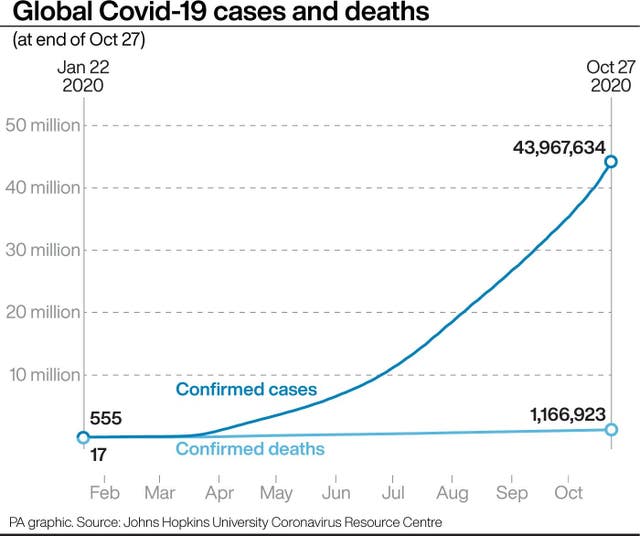
James O'Brien 10am - 1pm
28 October 2020, 20:34

The French leader said that a new nationwide lockdown would be the only possible way to successfully fight Covid-19.
French president Emmanuel Macron has announced a second lockdown in France from Friday, to try to combat a strong resurgence of the coronavirus.
With over 520 deaths recorded on Tuesday, the French leader said that a new nationwide lockdown would be the only possible way to successfully fight Covid-19.
“(France has been) overpowered by a second wave,” Mr Macron said in a national televised address on Wednesday.
The government is scheduled to lay out the details of the new lockdown on Thursday.
Mr Macron said schools would remain open.
Earlier German officials agreed to impose a four-week partial lockdown.
The World Health Organisation says the European region — which includes Russia, Turkey, Israel and Central Asia, according to its definition — accounted for almost half of the 2.8 million new coronavirus cases reported globally last week.
The UN health agency said virus-related deaths were also on the rise in Europe, with about a 35% spike since the previous week, as well as hospitalizations due to Covid-19.
“We are deep in the second wave,” European Commission President Ursula von der Leyen told reporters in Brussels.
“I think that this year’s Christmas will be a different Christmas.”
The European Union, Britain, Norway, Switzerland and Iceland alone accounted for 1.1 million cases over the past seven days, she said, “and we expect this number to keep rising in the next two to three weeks, and rapidly”.
Jamais la France ne laissera mourir des centaines de milliers de ses concitoyens, ce ne sont pas nos valeurs.
— Emmanuel Macron (@EmmanuelMacron) October 28, 2020
German officials have agreed to a four-week shutdown of restaurants, bars, cinemas, theatres and other leisure facilities in a bid to curb a sharp rise in coronavirus infections, Chancellor Angela Merkel said.
Ms Merkel and the country’s 16 state governors, who are responsible for imposing and easing restrictions, agreed on the partial lockdown in a videoconference. It is set to take effect on Monday and last until the end of November.
Ms Merkel said, “We must act, and now, to avoid an acute national health emergency.”
Restaurants will still be allowed to serve take-out food. Shops and schools are to remain open, unlike during Germany’s shutdown during the first phase of the pandemic.
The decision came hours after Germany’s disease control agency said a record 14,964 new confirmed cases were recorded across the country in the past day, taking the national total in the pandemic to 449,275.

In France, more than half of the country’s intensive care units are already occupied by Covid-19 patients.
France reported 288 new virus-related deaths in hospitals in 24 hours on Tuesday and 235 deaths in nursing homes over the previous four days. Both figures marked the biggest such rise since May.
“Nothing is more important than human life,” Mr Macron, noting that France has one of the biggest coronavirus rates in Europe currently.
“We are having 40,000-50,000 new identified contaminations each day,” he said.
Overall, Europe has seen more than 250,000 virus-related deaths since the start of the outbreak, according to a tally by Johns Hopkins University.
Belgium, the Netherlands, Spain, Britain and the Czech Republic have also seen a surge in new cases over the past 14 days, while infections rates in Germany were lower but climbing steadily.
Ms Merkel had pressed governors of the country’s 16 states to quickly agree upon a partial lockdown.
After they authorised the move, the chancellor appealed to people not to make unnecessary journeys and said hotels will not be able to accommodate people on tourist trips.
“We can say that our health system can cope with the challenge today,” Ms Merkel said. “But if the pace of infections continues like this, then we’ll reach the limits of what the health system can manage within weeks.”
The planning has caused anguish in Germany’s hospitality industry, with thousands of venue owners staging a protest on Wednesday at Berlin’s landmark Brandenburg Gate to demand further financial support from the government.
The loud but peaceful rally contrasted with angry scenes in the last few days, when anti-mask protesters clashed with police in the German capital, in several Italian cities and in the Czech Republic.
In Italy, Milan’s mayor, Giuseppe Sala, spoke out on Wednesday against a lockdown in the Lombardy capital, the epicentre of Italy’s new virus resurgence.
Ms Von der Leyen, the EU chief, acknowledged the growing toll that the continued crisis is taking.
“This time we have two enemies,” she said. “The coronavirus itself and corona fatigue, that is the growing weariness when it comes to the precautionary measures.”
Ms Von der Leyen insisted, however, that “now is not the time to relax.”